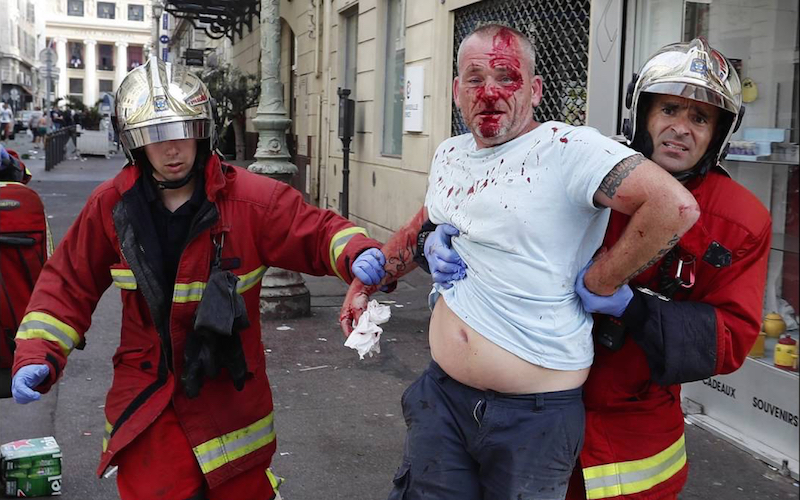
Russia’s “Little Green Fan” Problem: Football Hooligans, the New Nationalism, and the Western Narrative
The open enthusiasm of some Russian politicians about the thuggish behaviour of their football fans in France speaks volumes about the boorish nationalism and crude us-versus-the-world mentality that has been liberated by Putin in recent years. Compared with the ongoing war in the Donbas or the crackdown on independent media and NGOs, it may seem trivial to focus on Liberal Democrat parliamentarian Igor Lebedev’s tweeted comment that he didn’t “see anything wrong with the fans fighting. Quite the opposite, well done lads, keep it up!” or indeed Putin’s disingenuous question as to “how 200 Russian fans could beat several thousand of the British.”
But of course this is all part of a common pattern of mulish and wilful refusal to accept any fault or responsibility, a determination instead to blame everything on everyone else. And the result is a vicious circle that sees the rest of the world, although especially the West, all the less tolerant of Russia (witness the doping-related sanctions on its athletes). This, in turn, fuels Russia’s querulous persecution complex and the adolescent tantrums through which it is manifest.
And yet for all that, there is also a dangerous Western narrative that the Kremlin is the malign grandmaster behind everything that goes wrong, from Brexit to migration. The hooligan crisis has likewise been inserted into this unfolding narrative, notably in an article based wholly on anonymous and unsupported “Whitehall experts,” that “It looks like a continuation of the hybrid warfare deployed by Putin.”
Let’s put aside the fact that calling Russia’s approach hybrid warfare is unhelpful and inaccurate. The tissue-thin evidence on which this is based is that “a number of [the fans] are in the uniformed services” and that “UK police spotters saw some 150 Russia fans ‘tooling up’ with gum shields, fingerless martial arts gloves and bandanas.”
Russia has an inglorious and brutal history of very violent fan-hooligan activity. Any football match where stakes are high and rivalries long-standing tends to be the focus of a massive and heavy-handed police operation that involved truckloads of Interior Troops, hundreds of “cosmonauts” – riot police in full armour – and water cannon at the ready. These fanaty, alas, are more interested in the fight than the game, and train, prepare and kit themselves out accordingly. You don’t have to have been issued a Kremlin playbook to ‘tool up’ – and frankly if the Russians were training them as “hybrid warriors” I’d imagine they could come up with better advice than wearing bandanas.
It also ignores the point that for all the crass public statements from Russian politicians, the government apparatus was actually involved in sharing information with their French counterparts and back in May had already published a bill – since passed in the State Duma – on publicising blacklists of known hooligans. It is also worth mentioning that after first trying to make light of the problem, the embattled Sports Minister, Vitaly Mutko, then admitted that those involved in the violence “brought shame on their country.”
So the truth of the matter is complex. The current nationalist line obviously encourages those who choose to see it as granting them license to take their prejudices to the streets. Sometimes, the government actively seeks to use them, especially to intimidate the opposition. Yet the Kremlin is also keenly aware of the risks in uncontrolled violence and its populism has distinct limits. Furthermore, there are many within the government who are simply doing their jobs and embarrassed by and opposed to these law-breakers.
Let us in the West by all means decry the cheap and nasty rhetoric of the Lebedevs of this world, and acknowledge the deep social malaise which engenders this subculture of violent, right-wing, racist and homophobic tribalism. But let’s not try to twist and distort it into a narrative of weaponised everything, not only because it is wrong – though it is – but also because the more we lie to ourselves, the less able we are to deal with the real challenges before us. Every time someone decides to see a shadowy Kremlin hand in something over which it has no real authority, we empower Putin. Whether in over-stating his military might or, as here, seeing every tattooed hooligan as a “little green fan,” we build him up far more than he deserves.
This article was originally posted in In Moscow’s Shadows.

